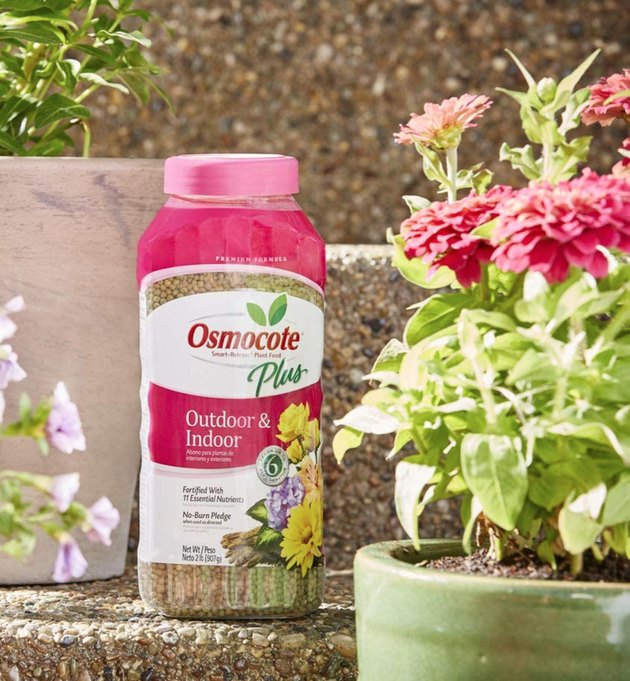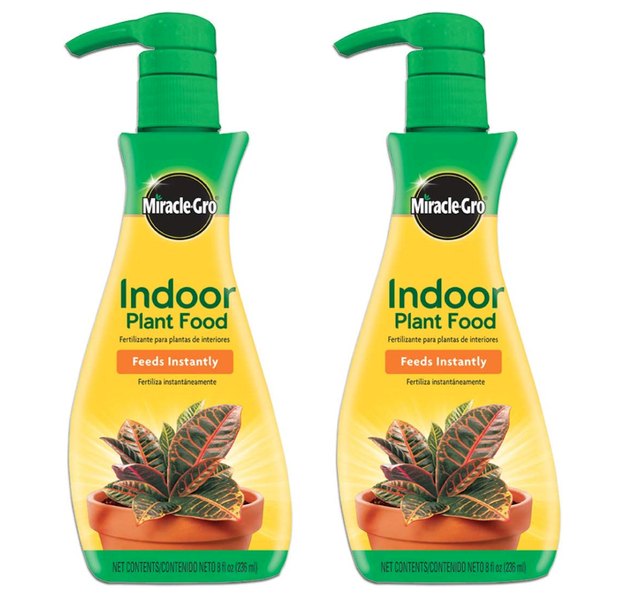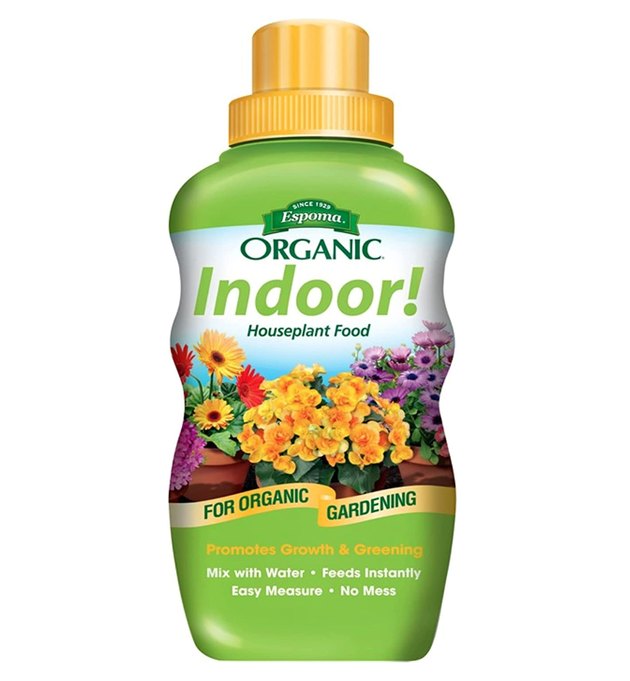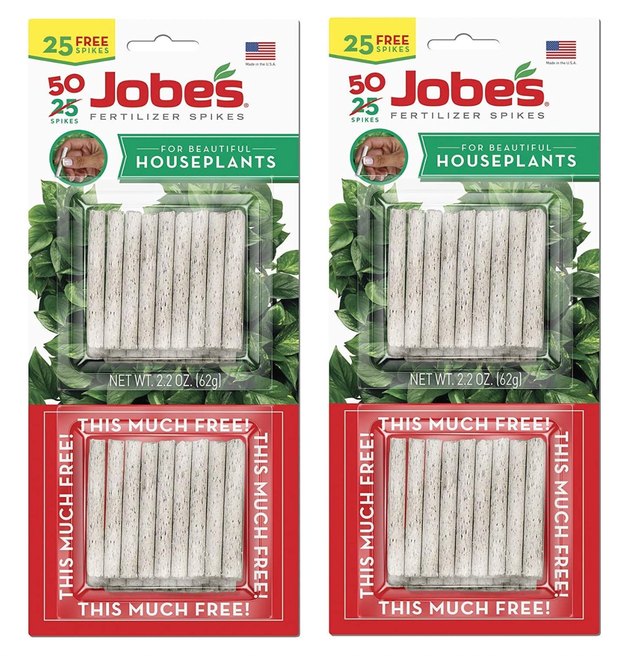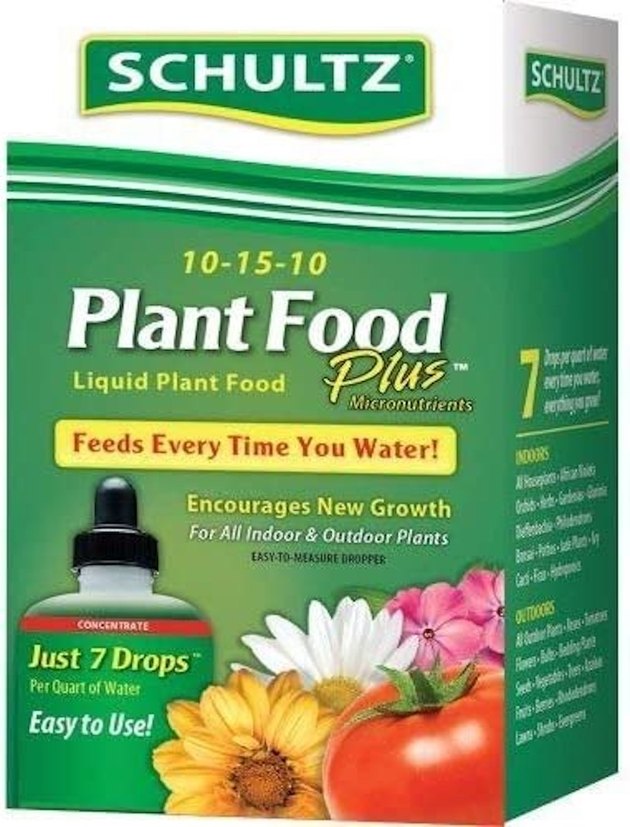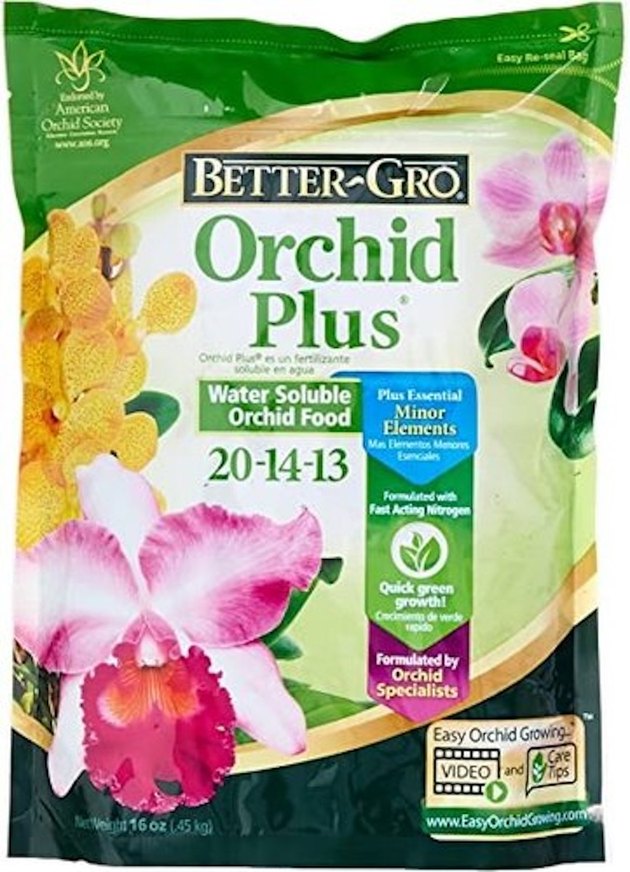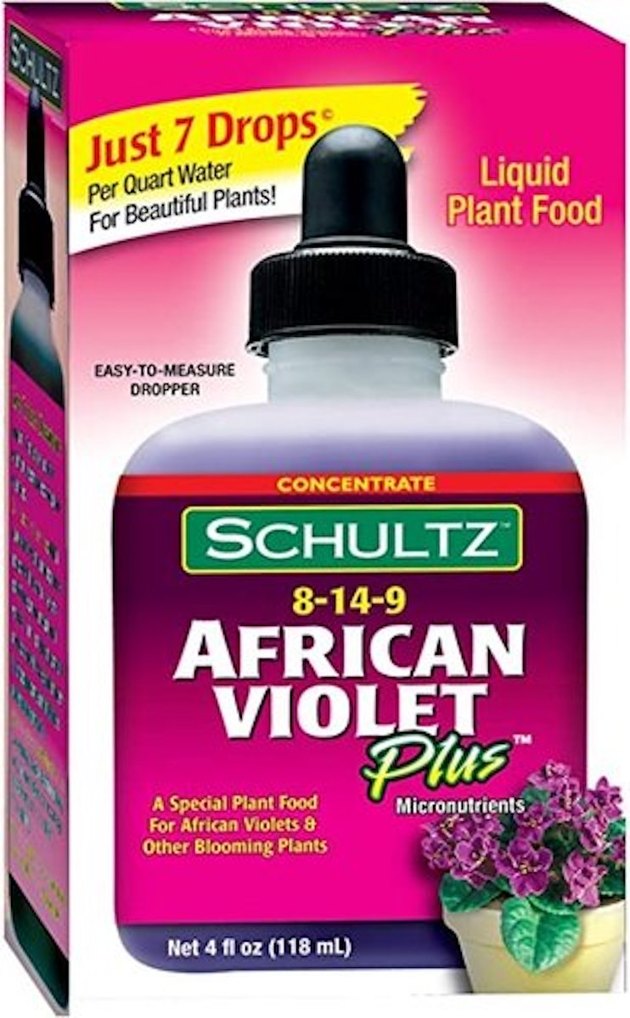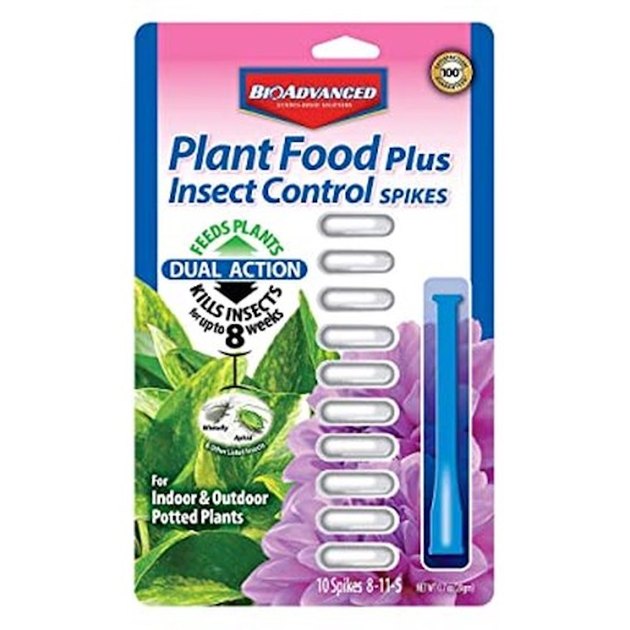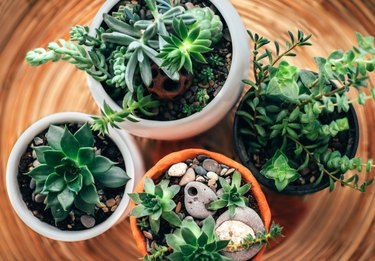
All types of plants, regardless of whether they are outdoor plants or potted houseplants, require essential nutrients for lush, thriving and healthy plant growth. However, unlike plants grown in the ground outdoors that receive a continued supply of organic nutrients, indoor houseplants require regular feedings of plant nutrients gained through the use of plant food. This replenishes the potting soil with much-needed micronutrients and macronutrients for your indoor plants to continue producing robust, problem-free growth.
A trip down the fertilizer aisle at your local garden center can be daunting with all the available choices. It can be confusing knowing which one is best. We take the mystery out of indoor plant foods and suggest what we believe are the best houseplant fertilizers. We've also noted important points of consideration when selecting the best indoor plant food and the best practices when it comes to fertilizing houseplants.
Video of the Day
Video of the Day
What to Consider When Purchasing the Best Indoor Plant Food
Best Time to Feed Houseplants: Always feed your houseplants while they are actively growing during the growing season of spring through summer. Most plants, including potted indoor plants, produce slower growth during winter. During this time they don't require feeding and their water needs diminish. Additionally, if repotting your plants you can wait a couple of months before feeding, as most types of potting soils and mixes contain a slow-release fertilizer that continues feeding your plants usually for up to three months or more.
Depending on the type of plant and type of plant food used, heavy feeders may require feeding every few weeks to every couple of months. Slower-growing plants require feeding less frequently than those producing rapid growth. It's always best to familiarize yourself with your specific plant's needs so you give it the best plant care for the healthiest growth.
Types of Fertilizers: Plant foods are broken into liquids, granular fertilizers and slow-release types. Liquid plant food is diluted with water and applied with a watering can. It is easy to control the amount, but you will have to feed your indoor garden more often than using a type that releases slower in the soil. Granular plant foods release nutrients into the soil when you water, and they are best utilized by incorporating them into fresh soil when repotting. Slow-release types like granules slowly release nutrients into the soil when you water. Most continue feeding your house plants for up to three months.
Organic Fertilizers vs. Synthetic Fertilizers: Organic fertilizers are made from 100% natural ingredients like worm castings, manure, compost, kelp and seaweed fertilizer. They are environmentally friendly with a diminished risk of burning the roots and excess mineral buildup in the soil. However, organic plant foods aren't as strong as synthetic types and can be smelly. On the other hand, synthetic blends are manufactured from man-made ingredients like sulfur, potassium sulfate ammonia, nitrogen, calcium and more. Regardless of which type you use, follow package directions on amounts and frequency of use. Remember, more isn't necessarily good plant care ,and over-fertilizing can end up in burned and damaged plants.
Best Food for Foliage vs. Flowering Plants: When selecting the best houseplant food for your indoor plants, consider their habits of growth. Regardless of whether the houseplant is an annual or perennial, if the plant produces showy foliage, using an all-purpose blend that has a higher nitrogen content (first number) is sufficient. However, if it's a flowering houseplant, the best fertilizer to promote blooms has a higher ratio of phosphorus (middle number).
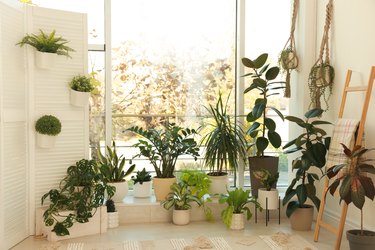
A Slow-Release, All-Purpose Plant Food
Osmocote is a slow-release all-purpose plant food that's safe to use on your houseplants and outdoor plants. It has an NPK ratio of 15-9-12 and also includes 11 essential micro and macronutrients your indoor plants need for healthy growth. It's easy to use and continues feeding all types of houseplants for up to six months. The granules are coated in a special resin that controls the release of nutrients depending on the soil's temperature and when you water. For the best results, mix the recommended amount into the top several inches of potting soil and water. Over-fertilizing isn't a problem if you accidentally use too much of the product, as it's guaranteed not to burn your plants. If you aren't fully satisfied, the company will refund your money.
An Edible Plant-Friendly Plant Food
Miracle-Gro liquid fertilizer is safe to use on all your houseplants, including any edibles. You can use the product full-strength mixed into the soil or dilute it first with water. It has an NPK ratio of 1-1-1, and because the fertilizer analysis is low, weekly feedings are suggested for the best results. This also means the chances of your plants suffering burning are very low. If any of your houseplants are starting to show signs of nutrient deficiencies, the plant food instantly feeds them. This quick feeding alleviates the plant from having to wait for the fertilizer to dissolve and slowly work its way through the root system. You can even use this indoor plant food as a hydroponic nutrient.
An Organic Indoor Plant Fertilizer
If you're looking for an organic indoor plant fertilizer that's safe to use around pets and children, then this concentrated mix from Espoma is a good choice. This environmentally safe fertilizer has an NPK ratio of 2-2-2, is easy to use and feeds your plants instantly. Its ingredients include poultry manure, fish protein, soy protein, kelp extract and bone meal, and will also feed the soil's microbes. It's specially formulated to feed all your houseplants whether large or small. It's easy to use, as all you do is mix the concentrate with water and thoroughly drench the soil. Continue feeding your houseplants by using the plant food every two to four weeks.
A Long-Lasting Fertilizer Spike
Jobes fertilizer spikes for houseplants are a breeze to use and feed your plants with all the major nutrients necessary for good growth. Each spike has an NPK ratio of 13-4-5, with the active ingredients of sulfur, potash, phosphate, calcium and magnesium. You simply push the recommended number of fertilizer spikes into the potting soil and they slowly break down as you water. They'll continue feeding your plants for around eight weeks before you need to replace them with new spikes. The spikes are safe to use on all your houseplants.
A Plant Food for All Indoor Plants
Schultz liquid plant food is suitable for use on all your indoor plants. It has an NPK ratio of 10-15-10, so it is packed with much-needed nitrogen for lush foliage, and with its higher phosphorus number of 15, will get those blooming plants flowering. It also includes essential micronutrients. Each time you water, the liquid fertilizer is delivered to the plant's root system, creating a stronger and healthier structure. It's easy to use and you only need seven drops per quart of water, so it's safe enough to use every time you water. It's even an excellent product to use when repotting, rooting cuttings or transplanting. You can also use it on any plants you have growing outdoors.
A Plant Food Specifically for Orchids
This plant food is specifically formulated for orchids and was developed by master growers. It has an NPK ratio of 20-14-13 and contains fast-acting nitrate nitrogen without urea. It also has a good amount of phosphate to promote blooming. Other essential ingredients include boron, magnesium, manganese, iron, copper plus more. These essential minor elements prevent any deficiencies that can occur with soilless potting mixtures. You can use the water-soluble mixture weekly, and you only need a teaspoon of the fertilizer mixed in a gallon of water.
A Plant Food for African Violets and Blooming Houseplants
This plant food from Schultz is specially formulated for African violets and other blooming houseplants. It has an NPK ratio of 8-14-9 with a high ratio of phosphates that stimulates your African violets and other bloomers to flower. It also contains all the micronutrients needed to keep your plants green and healthy. It's easy to use, as you only need to add seven drops of the liquid fertilizer into a quart of water, and then you just water as usual. The product is safe enough to use every time you give your plants water and immediately feeds the roots, leading to flourishing foliage and flowers.
A Plant Food for Insect Control
With Bayer BioAdvanced plant spikes, you can feed your houseplants while protecting them from pesky insects like mealybugs, whiteflies and aphids that can infest indoor plants. The slow-release fertilizer has an NPK ratio of 8-11-5 and will continue feeding your plants for up to two months. Each spike contains 2.5% Imidacloprid, which will also control insect infestations for up to two months and alleviates the need for messy spraying. The package contains 10 spikes and is suitable for use on all your potted plants, whether they're growing indoors or outside. They are easy to use, as you simply place them into the soil with the included applicator and water. Your houseplants receive the important nutrients they require for healthy growth while killing any pests that decide to feast on them.
